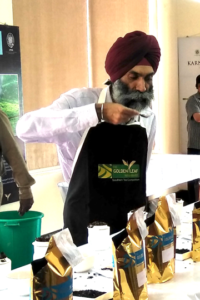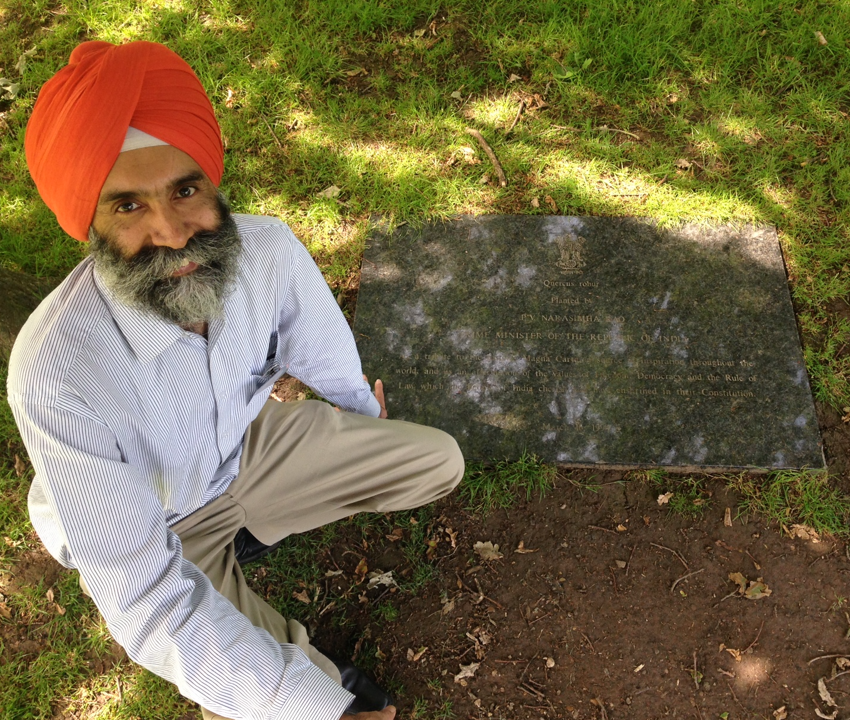
Gurmeet Singh’s eyes light up at the mention of the word ‘tea’ and the prospect of a conversation about it. Like so many great tea lovers, he too confesses that not a day goes by when he does not engage with tea. He calls himself a “compulsive steeper” who enjoys pottering in his garden to pick an herb here, a flower there to add to his tea. Gurmeet tweets as the Tea Scientist where much talk about tea happens, with an occasional scientific update from his research. Now, as I write these words, it occurs to me that he speaks of tea as one would about a real person, as a friend. That’s true love, if it can be called anything.
His current workplace is perfect for a plant lover; the campus of the University of Trans-Disciplinary Health Sciences and Technology on the outskirts of Bangalore hosts the country’s only national herbarium with a collection of 1,500 medicinal plants. Here, Gurmeet has established the Center for Ayurveda Biology and Holistic Nutrition leading a team of researchers as they digitize and recreate age-old recipes, and study it for scientific validity and modern application. But it’s tea that has brought him here, and it’s tea that we are talking about.
We begin at the beginning. “I didn’t know tea until maybe my 30s,” he says, adding that his father who was quite strict didn’t approve of young people drinking tea. Gurmeet was only 17 when his father passed away and this distanced tea even more. Gurmeet’s career took him through a Bachelor’s in Chemical Engineering at the hallowed Indian Institute of Technology, Delhi followed by a Masters and Ph.D. in the USA. He intended to return to the IIT, Delhi to take up the teaching job that was waiting for him.
“I met my wife in the US. I was finishing my Ph.D. and she was starting hers.” So, deferring his joining date he stayed on to teach at Penn State while his wife worked towards her doctorate.
Three years later, the couple planned to return to India to take up teaching positions at the IIT. But this is when you wonder about destiny and how it waylays the best-laid plans. And Gurmeet’s destiny clearly included tea.
Says Gurmeet, “When Unilever heard my wife was returning to India, they rolled out the red carpet for her. She was working on molecular dynamics and they were keen that she join them.” Gurmeet would have liked to remain at the IIT but his wife argued that the women’s toilets at the IIT Delhi campus were “awful” and there ended the discussion.
He too interviewed at Unilever in Bangalore. “They put me in the tea department,” he says, which is downplaying his role a bit, given that he has produced some 25 patents for Unilever.
“I was 32 when I joined Unilever. During my first year there, I never took to tea. I focused on flavor, color, aroma, molecules.” The tasting rooms were his least favorite places as he never approved of a single spoon used in tasting, finding it a bit unhygienic. “I’d hang back because I’d find that a drop of tea always fell back in the cup.”
However, the tea gardens and factories achieved what the tasting rooms had failed to do. Gurmeet’s first plantation visit was to Devarshola in the Nilgiris and he was hooked, not just by the landscape but the challenge he caught on while visiting the factory. Recalls Gurmeet, “The thing that struck me was the nice smell in the factory. I wondered why it didn’t end up in the tea. I wanted to capture that perfume.”

Among the research that Gurmeet did while at Unilever was to find a way to capture volatile aroma components of tea and concentrate it. “I created a different kind of R&D trial. When you dry tea, you are deodorizing it, the volatile components are lost so that even 0.1mg of aroma capture makes a difference. We wanted to use this at tea vending machines, create tea mats so the tea aisles in supermarkets would give out the aroma of tea. The aroma could be a good touchpoint. Customers should enjoy the aroma burst…” As he speaks, the excitement in his voice is growing, and although it’s an old story, he recounts it with the same contagious exhilaration of a new discovery.
The conversation reveals his love for tea as “It’s mesmerizing to see tea being plucked”, or “The tea factory is fascinating”, and even “I’d put tea in the center of the plate if I were the health minister.” He complains about how the National Institute of Nutrition’s book on foods consumed in India has more than 500 foods but not tea, “They think tea has no nutritional value!”
But Gurmeet admits that he didn’t expect to last in Unilever and fully planned to return to teaching at the IIT after a year or two. But Bangalore’s pleasant weather is notorious for converting even the most determined and that along with his growing attraction with tea kept him back. The Unilever R&D center in Bangalore was a global one and Gurmeet was busy! He is the first to have captured tea’s aroma and concentrated it economically in research that took five years.
“I wanted to make super infusing teas,” he says talking about another project where how he demonstrated that tea bags worked better on second and even third infusions. Instant tea was another passion and one of the samples he created was from tea sourced from the Devarshola garden. When he offered a cup to the Devarshola manager, the latter, he says, was stunned. His teas had never tasted so good!
Marketers spend too little time with researchers, rues Gurmeet. Yet, he persisted in his research, running an informal university in his research lab. He holds close the advice from his head of lab: “The products we sell may seem very mundane but the science behind them need not be so.”
Somewhere in the conversation, a philosopher emerges. “I find the tea plant fascinating. Every two weeks it gives its freshest leaves. It keeps giving. So many plants give in to stress, but not the tea plant.” And this, coming from one whose doctorate was on plant tissue culture, who once believed that one needn’t grow plants but could just cultivate what was needed. “It was arrogance,” he confesses. “I thought science knew everything. But now I know tea is a giver. The more I know about tea, the more I enjoy life…You can teach about life with tea.”
He talks about tea being significant in its sheer mundane-ness. My notes from our chat include aphorisms like “Meaningful life is made up of meaningless moments,” and also, “dolce far niente” (‘a sweetness to doing nothing’) that Gurmeet likens tea drinking too.
Almost 20 years after he joined Unilever, Gurmeet decided it was time to leave. He had been a visiting faculty at the University of Trans-Disciplinary Health Sciences and Technology and now, was invited to set up the Center for Holistic Nutrition and Ayurveda Biology. “I do believe in the power of plants, I have learned that from tea,” he says. There are 14 laboratories and a research kitchen here.

At his home, Gurmeet still tools around his plants and teas. His Infusions of Goodness is a monthly tea subscription service and members get three teas, including some of his own natural blends.
Gurmeet’s love for the plant may transcend places of origin and tea types but it’s anchored in what he believes will make a difference. “I want there to be a tea movement,” he says. “Two million people work in tea gardens, there must be a million tea vendors. If we all drink an extra cup of tea a day, we can alleviate poverty, we can change the face of the nation.”
That’s tea for thought.
Gurmeet,
Fascinating. As fascinating as interacting with you whenever you’re up at the Tea Studio.
Its tea-holics like you who make the world a better place.
Indi
Gurmeet, interesting to know there is so much to TEA than what has one thought all this while!
Being an aficionado and an avid tea drinker myself, tea in this narrative is very different indeed!!
Gurmeet , Really interesting and nice to hear you got to do what you were paasionate about
Meera
Excellent article Gurmeet. Destiny got you hooked to the thing that you liked the least. When are you coming to Delhi. Chai chalegi?
A beautiful article with limited audience, people like Gurmeet Ji should be highlighted for the younger generation to take up role models. Anything nature had given to humanity can never be a waste, it is meant for humans to take the benefit. Therefore, it is imperative to protect nature (forestation) is needed.